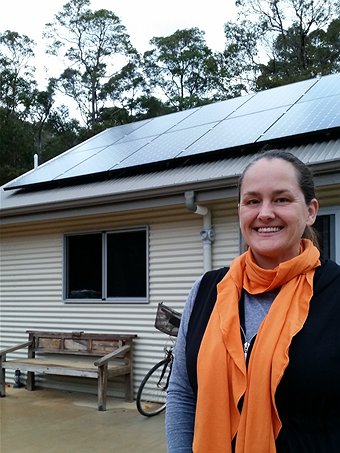The question of finding sustainable energy sources goes back as far as the time when humans first discovered fire. Now renewable energy is a global question. But it’s a question that may have a local answer.
To live a self sufficient lifestyle where you create your own electricity, collect all you own water and do without the services of power and water companies, is almost a romantic notion.
Kandi Watkiss and her family have been living in the house they built for four months in the Great Southern.
When faced with the maths of connecting to mains power, Ms Watkiss said the answer became obvious.
“It really wasn’t that much of a stretch for us to add in some more money and go completely off grid and then not have to pay power bills forever.”
When asked about the advantages of collecting solar energy for electricity, Ms Watkiss had a list of positives.
“If we want to run as much electrical equipment as we want, or have the oven on or use the clothes dryer which I quite like, we don’t have to worry about how much power that’s using or how much that’s going to cost.”
“The other thing is if there is a blackout, which there is quite frequently in Denmark, we don’t have to worry about that,” Ms Watkiss laughed.
“We were at a friend’s house recently and they were cranking up the generator in the rain and we came home to a lovely bright house with the fridges still running.”
Because the choice to go off-grid is still a new one, Ms Watkiss explained the family is still being conservative in how they use their power resource.
“Things like running the oven or the clothes dryer on overcast days, but so far we haven’t even managed to get the system down below half on the battery banks, so I think maybe we’re being a bit too cautious.”
While describing the family’s approach to collecting all their own water, Ms Watkiss suggested it is always better to have more than not enough.
“We like to not have to worry too much about water. We’ve chosen to have one big tank that does the house that’s a hundred and ten thousand litres and we also put in another tank up higher that will gravity feed once we get our all our vege gardens and everything in.”
Even in the short time the family has lived off the grid, Ms Watkiss said it was unlikely the family would ever go back to mainstream energy services.
“It’s really nice to think that well, we’re making everything here that we need.”
With a hearty laugh, Ms Watkiss added “and my kids are pretty stoked that in the event of a Zombie Apocalypse, we’ll be fine.”
As much as the Watkis family made their off-grid choice because of mains services being unavailable, the alternative energy and water choices are also appealing to people living inside town boundaries.
Planning to go off-grid
Ron Barnett lives in Denmark. He has mains services but is working towards his own off-grid future.
“I could be off the grid anytime it’s just a matter of investing in extra batteries and that would be about roughly ten thousand dollars but I could go off the grid without that if I wanted to.” Mr Barnett said.
Mr Barnett’s choice is not just limited to power. He has also invested in a self supported water supply.
“We’ve got two hundred and fifty thousand litres of rainwater that we use that supplies the house throughout the whole year.” Mr Barnett explained.
“The whole idea is that we wanted to go completely green. Rainwater is far superior than scheme water. It’s softer and it’s more healthy to drink. It hasn’t got any chemicals in it. That’s our main reason.”
Mr Barnett also said self-supported energy and water collections systems can work for everybody but for one major obstacle.
“The main thing is just the cost of turning over to solar and water and a lot of people just can’t afford it.”
“If the schemes became cheaper from the government and they gave them more incentives, I think that everybody would switch over to it.”
For further information: http://www.abc.net.au/local/stories/2015/05/29/4244941.htm


